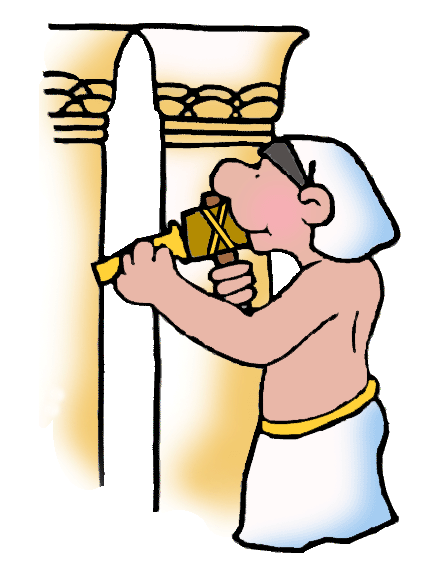
Ancient Egypt for Kids
Jobs
Several million
people lived in ancient Egypt. It was a big place to manage.
Pharaoh was in charge of everything. He was the head of the
military, the top priest, the head of government, and the main
farmer. In reality, Pharaoh had lots of help. He had an organized
army, a police force, and a huge number of ministers and
government officials who all reported to their boss, who reported
to the vizier, the pharaoh’s right hand man.
Nomarchs: A pharaoh’s palace was not only his home, it was the seat of government. Many officials had offices in the palace. Many had offices in the provinces. The country of Egypt was divided into nomes or provinces. There were about 20 nomes in Lower Egypt and a little over 20 nomes in Upper Egypt. Each nome (province) had a nomarch in charge. Nomarchs were not elected. They were appointed by the pharaoh or by the vizier in the pharaoh’s name. The nomarch was typically a member of the royal family.
Overseers: Each nomarch had many senior and middle-ranking officials to help them run the local government called overseers. Overseers had people to help them do their jobs. Everyone in government employed scribes to help them with the royal archives.
The archives were most important. Everything in ancient Egypt was written down and recorded – wills, deeds, tax lists, court results, journals, letters, memos, regulations, inventories, notes from meetings – everything. Everything they wrote down was sent to the vizier, to be reviewed, and ultimately to be included in the archives. The vizier, who reported directly to the pharaoh, was responsible for seeing that the archives were up to date and accurate. But that was only one of the vizier’s many jobs.
The Vizier: Next to Pharaoh, the most important person in ancient Egypt was the vizier. Everyone reported to the vizier. The vizier reported to the pharaoh. The vizier had a huge staff of scribes and assistants to help him do his job well.
The Egyptians loved titles. They gave themselves a string of titles, very impressive titles that were, for the most part, quite meaningless. Some of the princes called themselves viziers, but they did not do the job of a vizier. They just liked the title. The real viziers acquired such a reputation for honesty, integrity, wisdom, and dedication that they were worshipped in later years as gods. But their job was not to be a god. Their job was to deal out justice. The vizier had to submit a report daily to Pharaoh about the state of all of Egypt. That report included everything that the vizier had done and learned that day.
This system of jobs and government worked in ancient Egypt for over 3000 years!

Explore Ancient Egypt
Ancient Egypt for Kids
Geography, History, Government
Two Lands,
Unification,
King Menes
The Many Uses of Papyrus & Making Paper
Time Keeping and Shadow Clocks
Daily Life
Professions/Jobs
Professions,
Occupations
&
Jobs
Religion - Mummies, Gods, Goddesses, Myths and More
Gods & Goddesses of Ancient Egypt
Many Religious and Joyous Festivals
Canopic Jars (also spelled Canpic)
Games
Inventions and Achievements
Animals
Interactive Quiz Questions with Answers about Ancient Egypt by Topic
Five Themes of Ancient Egypt Geography
Ancient Egypt Arts & Architecture
Ancient Egypt Science & Inventions
Ancient Egypt for Teachers
Activities and Projects for Ancient Egypt
Lesson Plans and Units for Ancient Egypt
Vocabulary Lists and Interactives with definitions
Games: Free Interactive online for Kids to learn more about Ancient Egypt